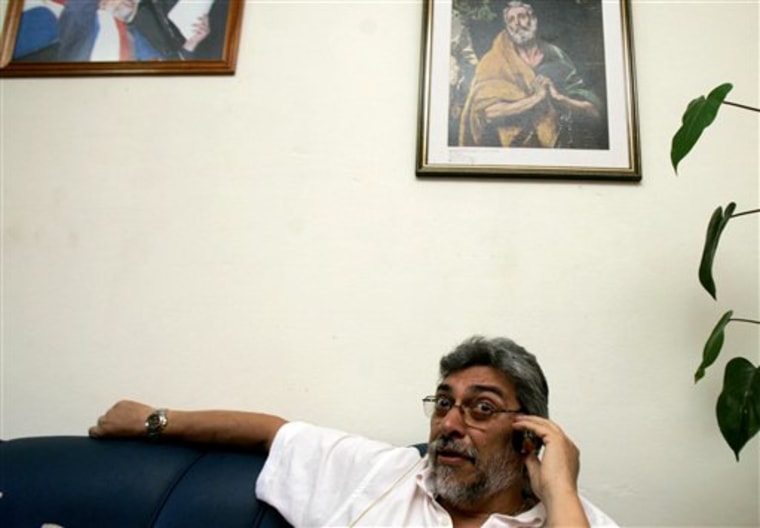The victory of the "bishop of the poor" in Paraguay's presidential election expands a wave of leftist leadership across Latin America and further isolates the few remaining conservative governments.
Once Fernando Lugo is inaugurated on Aug. 15, the only right-leaning governments in Latin America will be Colombia, El Salvador and Mexico — and arguably Peru, where a left-leaning populist party has gradually edged to the right.
"The triumph of comrade Fernando Lugo is ... yet another stone in the foundation of this new Latin America that is just, sovereign, independent — and why not, socialist," Ecuadorean President Rafael Correa gushed during a visit from Argentina's new leftist President Cristina Fernandez.
In an interview Monday with The Associated Press, hours after toppling the world's longest-ruling party, Lugo repeated his distaste for labels: "I'm not of the left, nor of the right."
But the former Roman Catholic bishop has said that Marxist-influenced liberation theology inspired his advocacy for the poor, and his victory clearly pushes Paraguay toward the left from the Colorado Party, which has ruled through dictatorship and democracy since 1947, including 35 years under brutal anti-communist Gen. Alfredo Stroessner.
Latin America's leftward tilt
Latin America's leftward tilt began with the arrival of Venezuela's Hugo Chavez a decade ago, then continued with new presidents in Brazil, Argentina, Uruguay, Chile, Bolivia, Ecuador, Guatemala and Nicaragua.
"Paraguay's election is just further evidence that Latin America's political geography has changed in basic ways," said Michael Shifter of the Inter-American Dialogue, a Washington-based think tank.
That said, there's a lot of political space between those leaders. Chavez has nationalized foreign companies and called President Bush the devil. Chile's Michelle Bachelet is a great booster of free-trade who Bush calls "charming."
Lugo, 56, may well find himself somewhere in between. His Patriotic Alliance for Change includes an eclectic array of socialists, centrists and even conservatives, all of whom will be fighting for a voice in his government.
He said Monday that his top priority will be to help Indians mired in poverty after spending much of his campaign traveling to poor Indian villages, where people told him they often go hungry.
Agrarian reform and poverty
He also promises agrarian reform and said he will take steps to ease the plight of 300,000 landless peasant families who work in cotton and soybean fields at paltry wages for rich landowners.
And he whipped up nationalistic fervor — and drew votes — by vowing to seek more revenue from Brazil from the world's biggest hydroelectric project, the Itaipu Dam on the two countries' river border. Paraguayans feel they don't get a big enough share of the revenue under a contract that expires in 2010.
Gloria Rolon, news editor of the Paraguayan newspaper Ultima Hora, said Lugo would clearly form a leftist government, "but how far left?"
The conservatives in Lugo's coalition will prevent him from doing anything radical, she said, and the Colorado Party still holds a congressional majority, control of the judiciary and a vast state apparatus.
"For this government," she said, "dialogue will be a necessity."
As for relations with Washington, Lugo told the AP he wants friendly ties with all countries, but vowed not to be "submissive" to powers large or small.
The U.S. signaled willingness to work with him. State Department spokesman Tom Casey said the elections are a "step forward" after Paraguay's "rather difficult history in terms of the development of democracy."
Lugo told the AP he would not move to the presidential palace, remaining instead in his modest house in a middle-class suburb. He said the first lady would be his eldest sister, 66-year-old Mercedes, who he described as "a woman worn out by hard work ... but she has always been my counselor."
First bishop to win presidency
Lugo is the first bishop ever to become president of a country. Both Paraguay and the Vatican ban clergy from seeking political office, so Lugo resigned in December 2006. But the Vatican said bishophood is "for life," even as the head of the Paraguayan Bishops Conference suggested Lugo risks excommunication.
In his interview Monday with the AP, Lugo issued a personal apology to the pope for his incursion into politics and said he hoped to return to his post as bishop after his five-year term as president.
"I love my church, and I don't want to abandon it," he said, adding: "I decided to serve my country as president. If this bothers the Holy Father, I ask his forgiveness."
